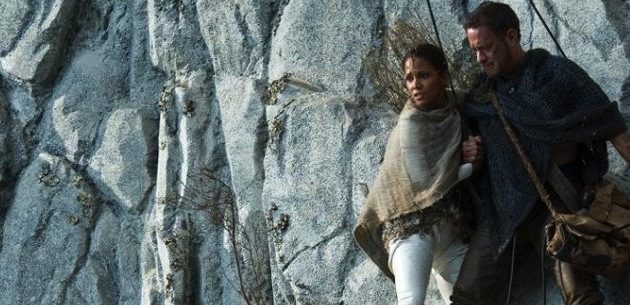REVIEW: Ambitious 'Cloud Atlas' Is By Turns Glorious, Moving − and Ridiculous

As is often the peril with movies of giant ambition, Cloud Atlas walks a crooked line between the glorious and the ridiculous, its reach unencumbered by sensible decisions or restraint. Adapted with reasonable faithfulness from a novel of equally epic sweep by British author David Mitchell, the film spans eras and genres, intertwining tales of men at sea in the 1850s with a 1970s conspiracy-based mystery with a dystopian future Seoul. Through these settings and the characters that populate them, the movie highlights themes of reincarnation and of the warring nature of mankind as empathetic and self-sacrificing versus competitive and brutal.
Directed by Tom Tykwer and Lana and Andy Wachowski, Cloud Atlas matches the scope of its settings and its motifs with an equally bold filmmaking choice: it reuses its actors in different roles in the different story threads, recasting them with the help of make-up and prosthetics across ethnicities and sometimes genders. Halle Berry plays the Jewish wife of a 1930s Belgian composer in one storyline and an African-American journalist in San Francisco in another. Hugo Weaving plays a female nurse working in a modern British old age home and an incarnation of the devil in a distant future version of Hawaii. Tom Hanks is a duplicitous 19th century doctor picked up in the Chatham Islands and the thuggish Cockney author of a popular novel in the present day.
It's a wild choice that underscores the film's suggestion of the transmutation of souls. As the main character — who's marked by a comet-shaped birthmark and played by various actors — makes his/her way through the eons and different lives, the recurrence of performers provides a visual reminder of this theme, tying together narratives that are wildly diverse in tone and content. It's also a technique that provokes some unavoidable amusement. Despite the quality of the production, there's only so much that can be done to plausibly turn Korean star Bae Doona into a freckled white aristocrat, Ben Whishaw into a blonde woman or Jim Sturgess into an Asian rebel leader.
And yet, there's something fiercely admirable about the film's dedication to this particular type of color-blind casting, even when it fails. (Well, almost color-blind — the black characters are all played by black actors.) Its hero, after all, is a soul, so why stand on ceremony about the malleable bodies in which it, and others, are housed?
That protagonist starts off, in the earliest story, as a villain — Dr. Henry Goose (Hanks), who treats the naive Adam Ewing (Sturgess) on their trip to San Francisco by ship in the mid-1800s with a medicine that is quite deliberately making him worse. He is reborn, in the era between World Wars, as Robert Frobisher (Whishaw), an English composer whose love affair with another man gets him disinherited. That leads to him working for an established talent named Vyvyan Ayrs (Jim Broadbent) who's not as benign an employer as Frobisher would like.
In the 1970s, he's become a she — Luisa Rey (Berry), a Californian journalist whose investigation into a nuclear plant cover-up lands her in danger. In 2012, she's Timothy Cavendish (Broadbent), an aging publisher who gets both lucky and unlucky with a hit book and who finds himself committed to a militant nursing home from which he'd like to escape.
In Neo Seoul in the near future, he's become Sonmi-451 (Bae), a cloned waitress at a chain restaurant who experiences an awakening from the conscripted life that labor "fabricants" are intended to have. And in the far-flung reaches of the film's timeline, she's become Zachry (Hanks), one of a small community of peaceful villagers living in Hawaii after the collapse of civilization and trying to avoid the savage cannibalistic faction the remaining humans on the island have become.
These stories connect within each other and, unlike the nesting doll structure of Mitchell's novel, they're intercut. The film stays with one story for long minutes or dips into another for a brief glimpse. Every thread is, in essence, about the powerful oppressing the powerless and what it takes to put oneself at risk to help others, whether it be an escaped slave stowaway or a manufactured corporate server. Despite the showiness of the structure, it's the films smaller moments that leap out as emotionally wrenching: an encounter with an old love at the top of a cathedral, a man carrying his sick friend out to sit in the sun, a rallying cry at a pub.
Cloud Atlas strives continually for transcendence and only sometimes grasps it, but the sincerity with which it pursues the emotion and the very idea of the reverberating impact selfless actions can have is quite moving. It's rare, these days, to see a movie declare its aims for greatness so openly and without a leaden sense of self-importance. And though the film doesn't achieve all of its goals, it does offer an indelibly powerful vision of a throughline from the past to today and on through the end of things, that expresses faith in the ability of people to overcome animalism. It's spiritual but entirely humanistic, and salvation, when it comes, arrives from within or from other people — an outrageous, silly and beautiful ode to the better nature of mankind.
Follow Alison Willmore on Twitter.
Follow Movieline on Twitter.

Comments
Great post. I’ve seen several mixed reviews of this movie, but I’m still really interested in seeing it. One of my DISH co-workers brought me her copy of the book to borrow, so I’m going to read that before I see the film. I’m a slow reader, though, so I think I’ll probably have to skip seeing it in the theater. I’ve already got it sitting at the top of my Blockbuster @ Home queue, so as soon as it’s out on DVD it’ll show up in my mailbox. I’m already looking forward to it.